This Giant Guide on What is Emotional Intelligence and Understanding Emotions Includes
- What Are Emotions
- Understanding Emotions and Feelings – How to Process Emotions
- The Non-Duality of Physical Sensations and Emotions – Where Do Emotions Come From?
- Separating Purely Physical Distress From Emotions is Important – Understand Your Emotions
- What is Emotional Intelligence and Managing Emotions Intelligently to Live a Better Life
- Different Kinds of Emotions
- How to Deal With Emotions
- Philosophy of Emotions
- How Do Cultures Perceive Emotions?
- My Emotional Journey
- How Do I Manage My Emotions (now) to Live a Peaceful Life
- Footnotes
- All Articles on Emotional Intelligence
 Pieter Brueghel the Elder, Public domain, via Wikimedia Commons
Pieter Brueghel the Elder, Public domain, via Wikimedia Commons
What Are Emotions?
“The root of the word emotion is motere, the Latin verb “to move,” plus the prefix “e-” to indicate “move away,” suggesting that a tendency to act is implicit in every emotion.”
The latest definitions explain emotions as our response to our (inward and outward) current situation. Emotions tell us we need to act.
“An emotion is your brain’s creation of what your bodily sensations mean, in relation to what is going on around you in the world.” — Lisa Feldman Barrett.
Lisa Feldman Barrett is a leading neuroscientist and author of the pioneer book on emotions How Emotions Are Made. Most of the facts and research in this piece on managing emotions are taken from her work1.
We should observe our emotions, see if they are an appropriate response to the time, and proceed suitably.
Understanding Emotions – How to Process Emotions
You must have felt terrified before a big presentation or a poem recitation. Some people get cold feet before their wedding. But that tension doesn’t mean everything in life is wrong and we should run — that would be a wrong action. The nervousness, the grumbling of the stomach, and dry throat – sensations that make us feel we are frightened – could just be suggesting we are excited and preparing for something unknown. We can should harness that energy rather than becoming fearful of it.
We might hate getting up at 5 am to work out for fifty minutes. Sometimes spending a day at our estranged parents’ home could fill us with unease. Working a couple of hours on Sunday evening may impress on us that our life sucks. But these temporary, discomforting feelings don’t imply that we are leading poor lives. In fact, all of these actions could bring us long-term health, happiness, personal growth, and career stability.
Unpleasant emotions don’t necessarily mean we are set for doom. They may just be the indications of a pending action we need to finish, the impending effort that is due on us2.
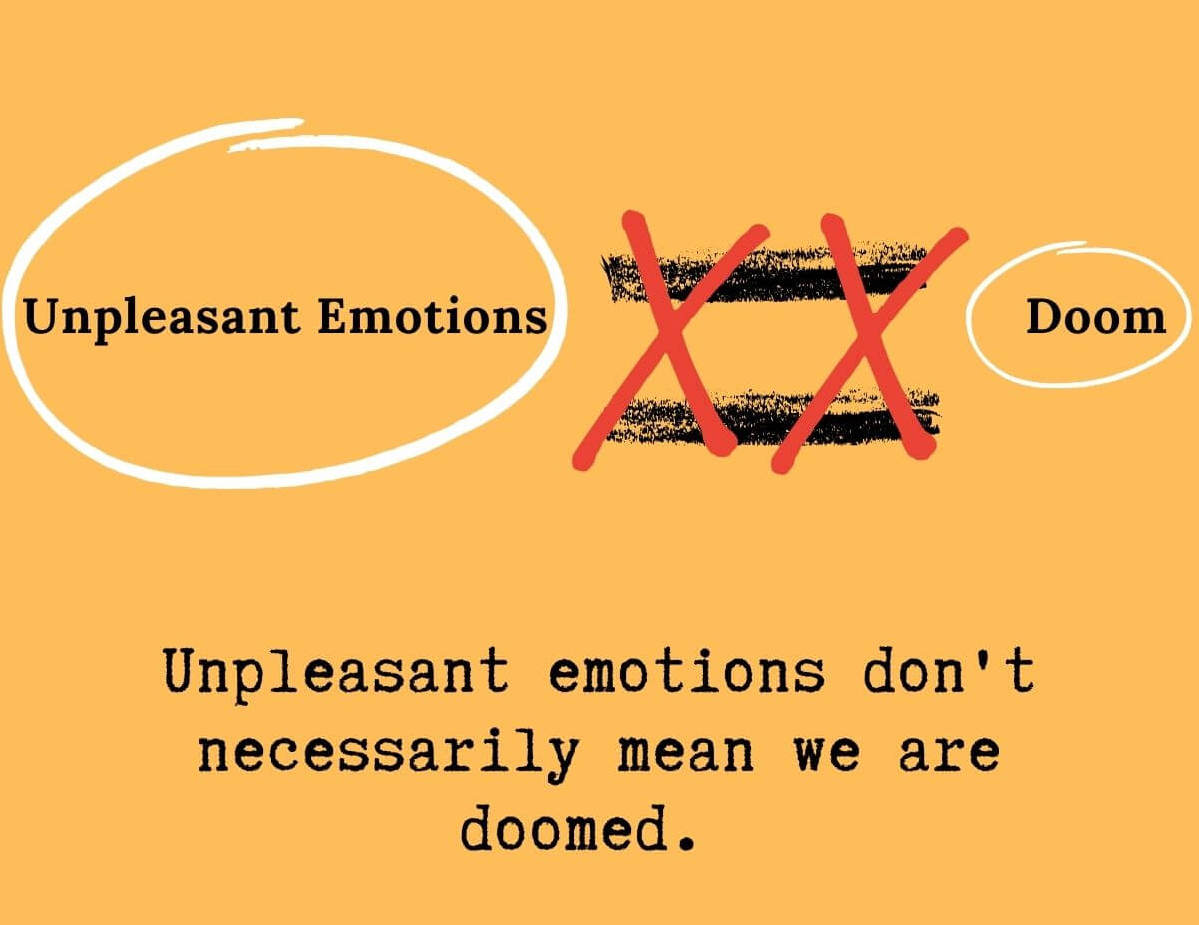
“The thing is, a bad feeling doesn’t always mean something is wrong. It just means you’re taxing your body budget. When people exercise to the point of labored breathing, for example, they feel tired and crappy well before they run out of energy. When people solve math problems and perform difficult feats of memory, they can feel hopeless and miserable, even when they are performing well.” — Lisa Feldman Barrett.
And pleasant emotions don’t always guarantee happiness, wealth, or health. We may rejoice momentarily by the idea of eating a scoop of ice cream after dinner every day, watching our favorite television show until after midnight, or dating someone who reminds us of our home, but none of these might make us healthy, happy, or stable in the long-term (or even on short-term).
We would need to assess the values provided by each of these things, activities, and people beyond the fleeting satisfaction they promise. On the other hand, an invitation to play badminton with a friend, an evening walk on the beach, or a cooking session with our partner could be taken on the joyous face value for these simple activities might bring the intermittent happiness, playfulness, and cheer we crave (they would do us long-term good too).
If we never wake up early to spend an hour with our family before a hectic day because getting up earlier than usual makes us miserable or if we stop talking to a friend on the slightest of discomforts, we will eventually end up lonelier and desolate – even though we will feel content for a little time.
Initially, we maybe be scared to drive in traffic. But our uneasiness doesn’t mean we shouldn’t drive. We will have to brave through those hundred or so hours of driving practice before we become confident. We shouldn’t decide not to do things based on our fear or discomfort or initial lack of skill.
Because of the deceitful nature of emotions (and our ill-informed awareness of emotions) we see how important it is to understand emotions before making conclusions or taking any actions3.
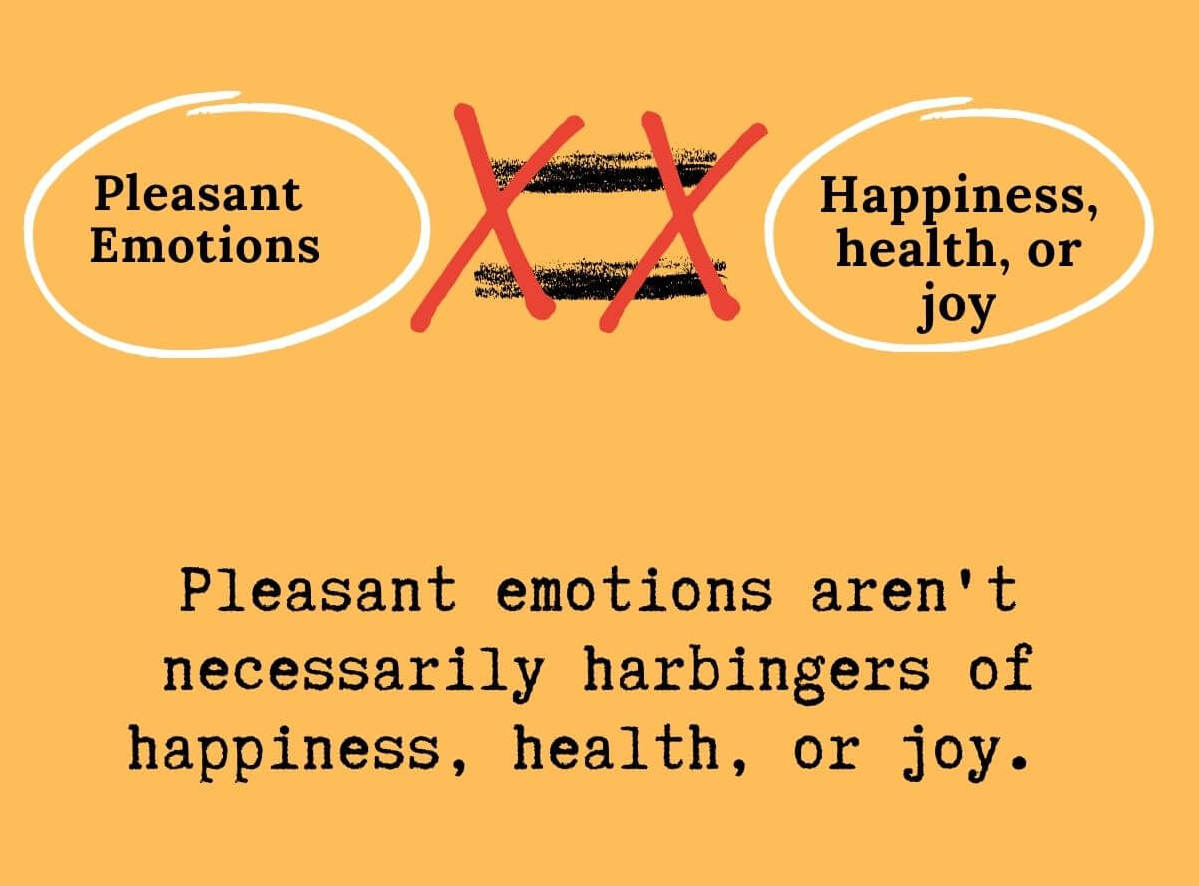
The Non-Duality of Physical Sensations and Emotions – Where Do Emotions Come From?
If we experience jitters and our stomach growls after stuffing ourselves with a giant mushroom pizza, we may be falling sick and should stay close to the bathroom (stock toilet paper, too). Or if we feel feverish, we might really have the flu and not just the fear of the upcoming semester-end tests.
You must wonder why did we interpret the groan of the stomach as excitement before. Or why are we understanding physical reactions as purely physical now?4
Physical sensations and emotions are as non-dual as water and wave in the ocean. We make meaning of our physical feelings in context with our surroundings and past experiences – we call this meaning emotion – to understand the right course of action.
Our brain produces bodily sensations that we understand as emotions.
Neuroscientists lay down the formula of emotions as below,
past experience + present circumstance = (our brain creates) physical sensations = (we interpret them as) emotions = right course of action
An Interview with the neuroscientist Antonio Damasio sumps up emotions, “essential insight is that feelings are “mental experiences of body states,” which arise as the brain interprets emotions, themselves physical states arising from the body’s responses to external stimuli. (The order of such events is: I am threatened, experience fear, and feel horror.) He has suggested that consciousness, whether the primitive “core consciousness” of animals or the “extended” self-conception of humans, requiring autobiographical memory, emerges from emotions and feelings.
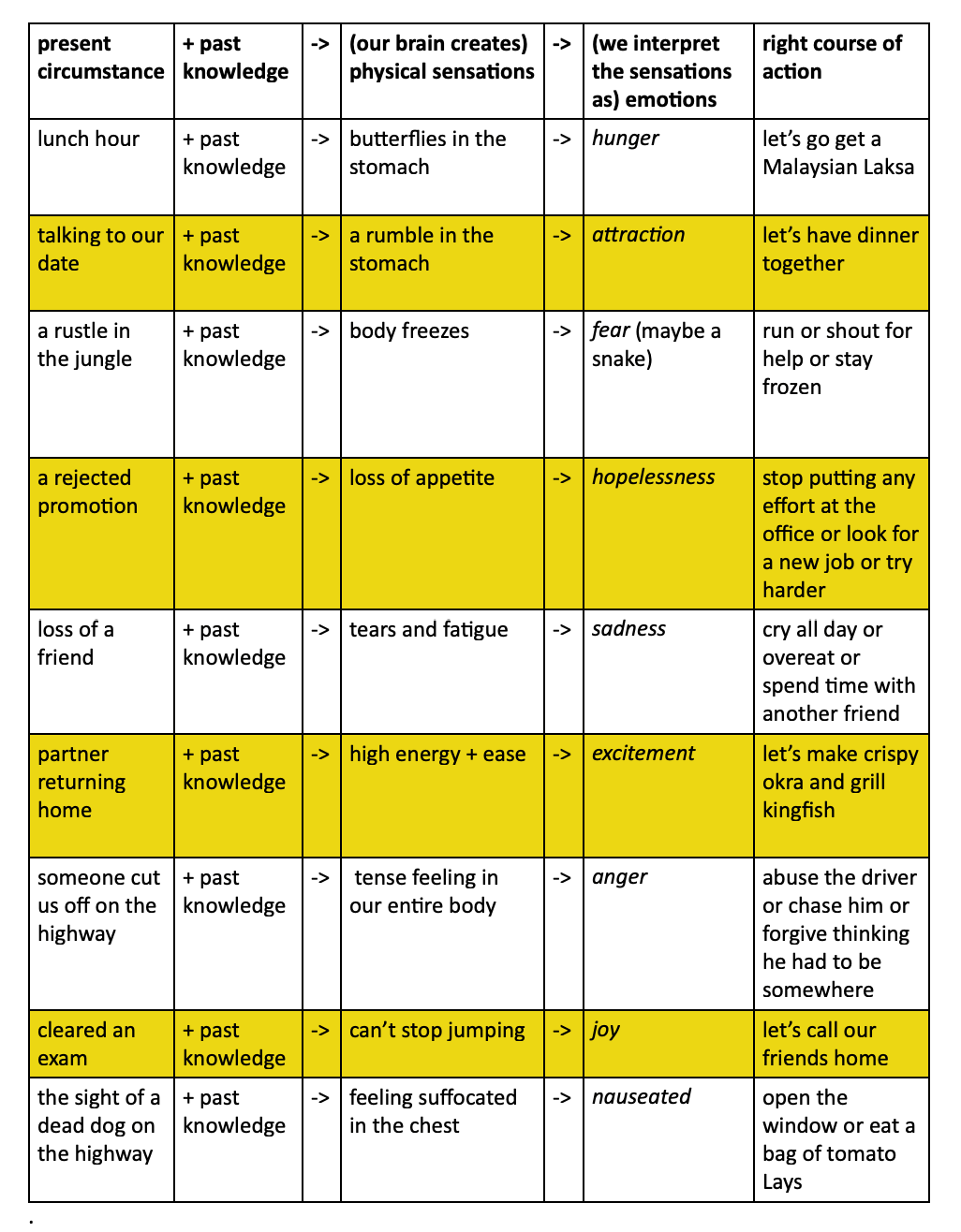
We can understand the past as the sum total of all human understanding. All the instances of emotions (attraction, joy, fear) are drawn on this collective past and our experiences. In fact, we understand the outer and inner world every living second based on the aggregated information of the past.
We wouldn’t know to get a Malaysian Laksa if we never had it or heard about it. This is our past experience coming into play at lunchtime (oops). Or if we never had a tense feeling in our body before, we wouldn’t know we are experiencing anger. We may think we are falling sick. We might never guess a snake’s presence if we didn’t know snakes live in jungles. In fact, we wouldn’t even know what a jungle is.
We make sense of everything by searching for it in our gigantic library of past.
In all the above examples we find ourselves in a place and circumstance. As the purpose of our brain is to keep us alive happily and healthily, it predicts what will happen and what should be our following steps5. And our brain initiates those next moves through bodily changes such as a racing heartbeat or freezing or stomach ache or spinning of the head.
So if someone shouts at us on the road, our body would prepare itself for the combat. Cortisol and glucose will get released. The fight or flight instinct would get activated, and we would feel charged to protect ourselves. Our face might tense up and our brows would furrow. We are getting aggravated to respond to the situation. Our mind is preparing us.
But all of this happens inside our body so fast we can never really pick out the sequence of thoughts or actions6. So when someone cuts us off on the highway, we never realize that our body is tense before we react or know that we are angry. We start hurling abuses even before we know it.
We realize most of the physical sensations and emotions at the same time.
Separating Purely Physical Distress From Emotions is Important – Awareness of Emotions
All emotions are manifested in physical sensations. And some of those physical feelings remain purely physical: such as hunger and nausea.
During my driving course recently I got a tight stomach ache before every class on the first four days. The ache seemed physical. I wondered if the breakfast dosa made my stomach unwell every day 2–3 hours before the class. But once I was driving, I would forget about the pain. Reflecting, I understand that pain was a psychosomatic reaction of my body to the nervousness of driving on busy Bangalore roads. But the anxiety didn’t mean I shouldn’t go to the class. So there was no real course of action there. I did however tell myself to relax and ended up driving well and had a lot of fun in all the classes (Mani sir in Bangalore’s Balaji Motor Driving School is a real good, hands-on teacher).
When I was little I got a fever right before my mid-term exams. I wasn’t sick because of test apprehensions. I was good at studies and looked forward to tests. I skipped the exams and sent a medical. The situation wasn’t emotional back then.
Emotional Intelligence and Managing Emotions Intelligently to Live a Better Life
In many of the simple instances above people can react differently to the situation.
While some of us would cry alone when we lose a friend, some would find other friends to comfort themselves. I might make okra and kingfish for my partner but you may want to order from outside and play scrabble. If we are in a complex situation, such as when we feel cheated upon losing a promotion or get cornered by our in-laws, we don’t know what to do. We may react without taking a moment to analyze the right measures and create more trouble for us and others.
If we chase down the highway driver or cut off our friends in our loneliness or decide to destroy the boss who didn’t promote us, we may end up (further) hurting ourselves physically or emotionally. This is impulsive behavior, or some might say, you are being blinded by emotions. When we feel an emotion, we should first analyze it and see if we have made the right conclusion.
A rewrite on emotional intelligence teaches us, ironically, emotional intelligence is also knowing when not to construct an emotion. When you’re feeling overwhelmed, take a moment and consider non-emotional explanations for how you feel. Perhaps that jittery feeling in your stomach isn’t anxiety, but determination. Maybe that bitchy coworker is simply hungry. A feeling of distress when talking to your mother isn’t evidence that she said something wrong. Remember that your brain is always guessing, and sometimes its guesses are wrong.
This is the time when we need to comprehend our emotions, what they mean for us, what should we do, and how should we come out of the fix — this is called managing your emotions. And we should also use our emotional awareness to understand other people’s emotions and act considerably7.
Emotional intelligence is understanding your emotions and others’ emotions well.
When we are going through a breakup, we may feel angry at our ex. After all, he promised us the world. In our anger we might become revengeful. Or if someone writes hate speech about us on a public platform, we may want to engage in a disrespectful debate. Acting impulsively and creating trouble for others in both these situations would imply we are completely at the mercy of our emotions.
Instead, we have to interpret that breakup anger as a personal loss and not as a vicious attack. Our body and mind are preparing us for the absence of someone who had almost become a part of us. We have to accept that now we have to navigate the world alone and we need time to be able to stand on our legs again.
But what about the ex’s unfair treatment of us? You can do what you have to do to feel calm. I might send a letter or an email telling him how he was a poorly behaved person. Now he is responsible for his actions and I’m for mine.
Instead of engaging in an unrelenting exchange of abusive comments over the social media platform, I would express my opinion (if needed and if this isn’t an everyday thing), report if someone threatens me, turn off the notifications, and move on.
Yes, it is that simple. But when we come to it, staying cool seems hard.
We also need to sieve others’ scornful comments or irrational behavior through our awareness of emotions before calling them evil or cutting them off. People aren’t inherently bad. Like us, they are also trying to survive and making the best of the time in their circumstance. We may feel they body-shamed us or wanted to hit us on the road, but they may be dealing with their own body issues and saving themselves from a rash driver on their left (who might also be struggling with her things). Mostly people are not judging us, but judging themselves.
The best way to respond in an uncomfortable human exchange is to first take a few deep breaths and then react knowing that no one wants to harm us but they want to benefit themselves, like we do, too.
Different Kinds of Emotions
Human beings can feel so many different kinds of emotions we can’t even list them all. But here are some feelings that were on the top of my mind.
We may experience
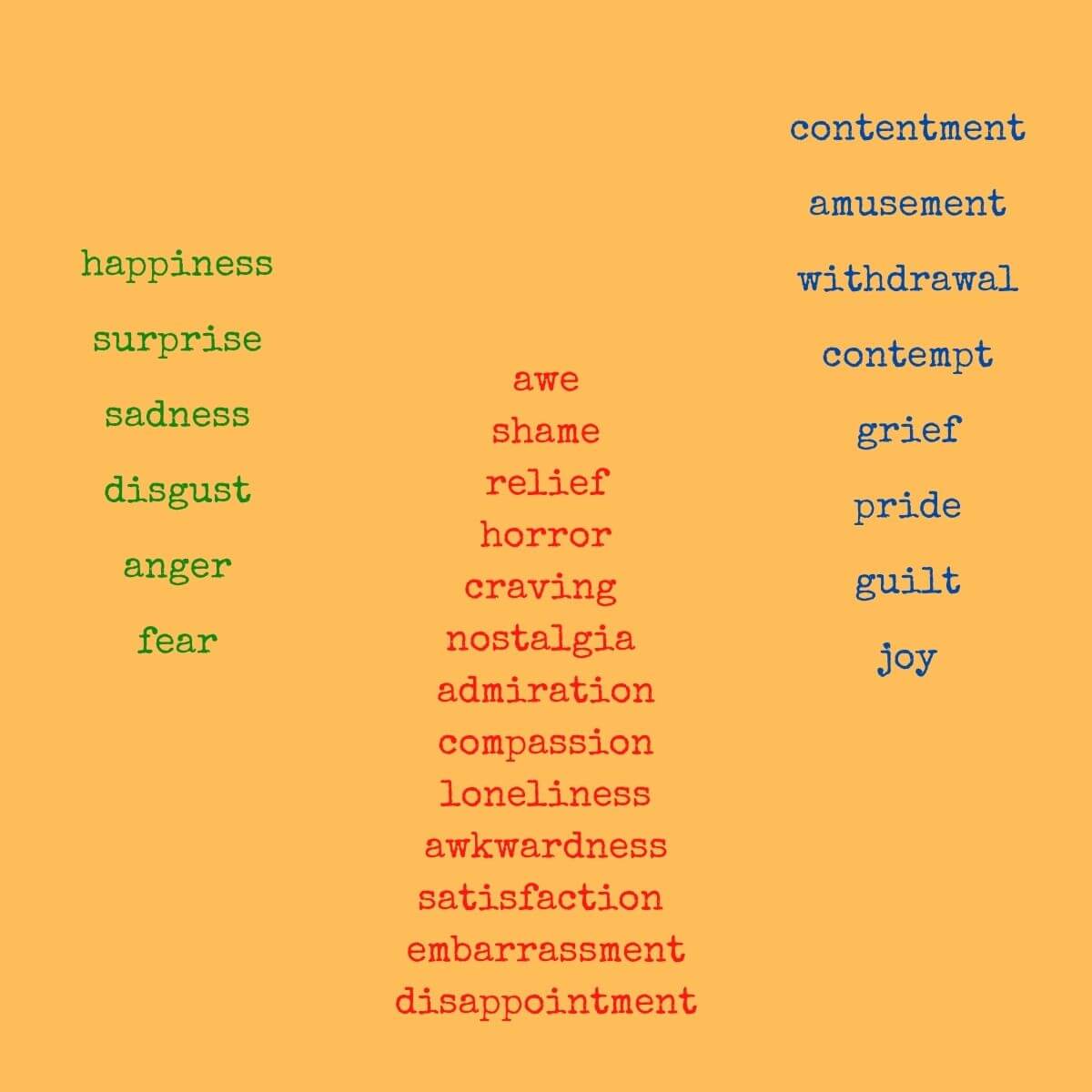
We may feel
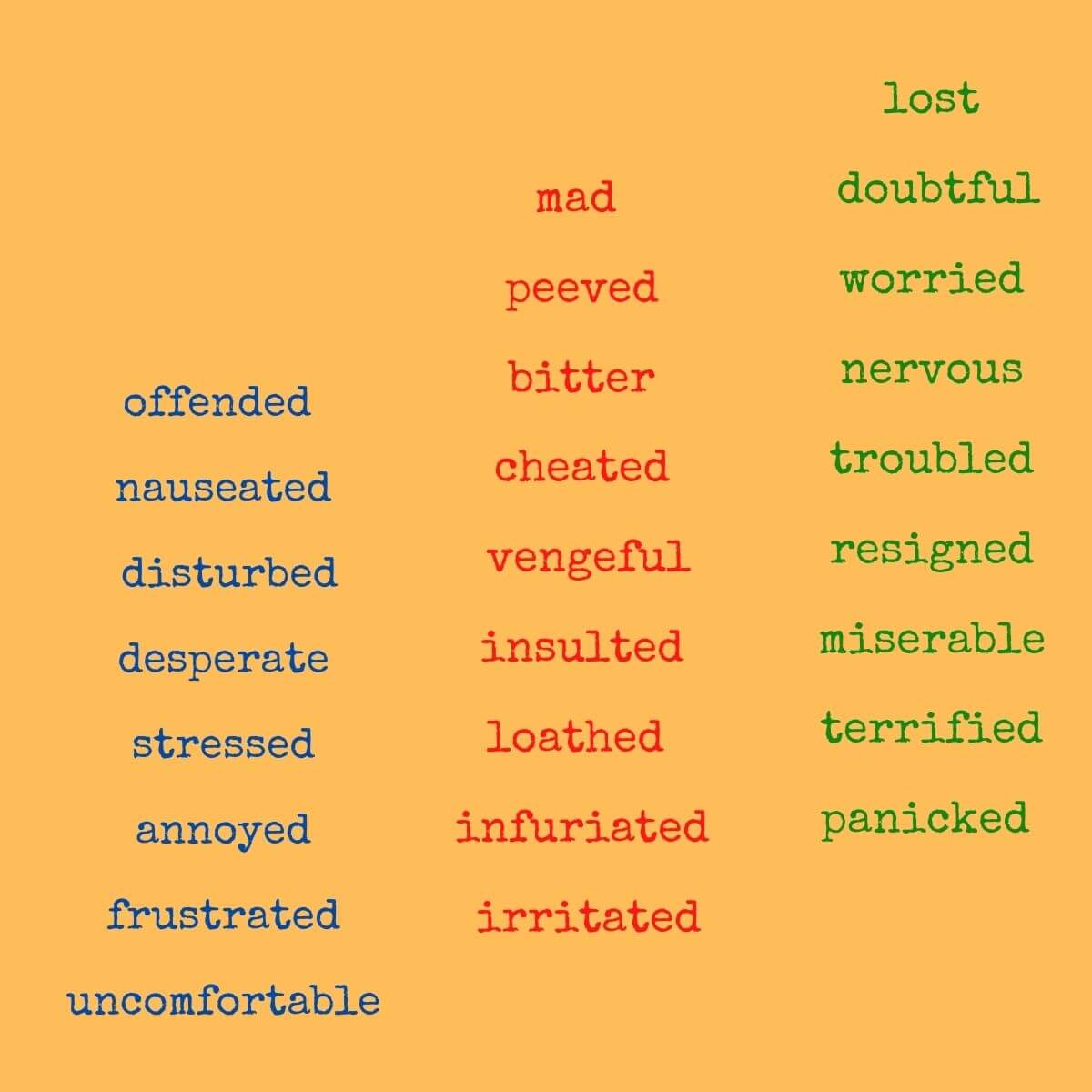
How to Deal With Emotions
Every time we feel a surge of emotion, we have to analyze it before reacting to it. Once the process of handling your emotions slowly becomes a habit, you would find yourself judging the situation before exploding.
Let us talk about some emotions in more detail.
Sadness
We find ourselves sad from time to time. We feel crappy and disheartened. Some morning we feel we are at the depth of an abyss. In the evenings we become gloomy.
Mostly we don’t know why we are sorrowful or dispirited. But our cheerlessness might be suggesting we lack something we want or we feel a lack of control or someone hurt us or we aren’t where we imagined to be or something didn’t go the way we would have liked.
At every instance of sadness, we have to try to find the reason behind our gloominess. Then we have to do our best to resolve the situation and leave it at that.
If we feel dejected about not getting promoted, the correct response is not to drink and forget about our menial job. The right way to deal with this disappointment is to work hard or to look for another opportunity. Or if we are irritated because our wife leaves us alone to prepare dinner, we should talk to her (rather than exaggerating her indifference to the neighbor.)
Remember, emotions indicate we need to take an action. And when we can’t do anything, we can still choose our reaction to the circumstance.
Fear
Fear doesn’t mean we should stop. And being fearful isn’t something to be ashamed of.
We should ask ourselves why do we feel intimidated before speaking our opinion in a meeting or why have we yet again postponed the law exam that would help us get a better job. Running away from the problem is never a solution – a temporary discomfort shouldn’t be taken so seriously that we abandon the activity that would bring us long-term growth and happiness. We need to believe ourselves, practice harder, and listen intently. The only way is through it. The more we do it, the less we would be scared.
Our family may shower us with guilt if we go on a foreign trip. But instead of being afraid, we should realize that a life spent on fulfilling others’ expectations will lead us nowhere. But if we are scared of the ocean because we don’t know how to swim, our fears are legitimate. We should first learn swimming and then jump.
You aren’t special you know. If they can do it, you can do it.
Let us analyze our horrors and see which ones aren’t justified. Now let us go on. If we stop because we are afraid, regret will fill our life. This remorse will soon turn into unhappiness because we aren’t there where we want to be.
Anger
Are you angry because someone hurt you or because you think they hurt you?
Sometimes my partner says something unpleasant. When I question him, he admits he didn’t want to upset me. I still take my own sweet time to convince myself he didn’t mean bad even though I know he loves me and wouldn’t cause any harm intentionally (at least not on something so trivial). But my mind is just protecting me by becoming defensive. Later I apologize to my partner and tell him I overreacted.
I’m trying to train myself to not react immediately to a seemingly cruel comment. But I have a long way to go in learning how to be happy in a relationship (the linked piece has 3 secrets).
When someone external tries to insult me, I take it at face value. I still don’t react indecently because I’m responsible for my actions and they for theirs. But I make sure I’m safe and if needed, I would channel my anger to protect myself.
Understanding the source of anger (or any other emotion) is the first step in mastering your emotions. We should take our time and not react immediately unless we face an immediate threat. Let’s revisit our thoughts on the matter. We should call out the relevant people. If we are angry with ourselves at something we didn’t do, then we should consider forgiving ourselves.
We are only human, after all.
And now I shall stop because emotions are so many. But let me keep adding to this list whenever I think of good examples.
Dealing With Emotions — In Conclusion
We need to listen to our emotions and understand them correctly. Emotions not only have to be distinguished from physical problems but they have to be differentiated from each other8.
We should learn more emotion words and concepts. Analyze what is it that we or the other person is going through. Then we should take a moment before replying. Slowly we would understand ourselves and others better and manage our emotional responses more coherently.
Philosophy of Emotions
Apart from scientific truth, there is a lot of philosophical depth to emotions. Every lucid thinker — from Proust to Alain De Botton to Martha Nussbaum — has devoted their energies to understand and explain emotions. All of them agree that emotions are not something to be afraid of but that they are our guiding lights — when rightly used.
“It is almost impossible to understand the extent to which this upheaval agitated, and by that very fact had temporarily enriched, the mind of M. de Charlus. Love in this way produces real geological upheavals of thought. In the mind of M. de Charlus, which only several days before resembled a plane so flat that even from a good vantage point one could not have discerned an idea sticking up above the ground, a mountain range had abruptly thrust itself into view, hard as rock – but mountains sculpted as if an artist, instead of taking the marble away,had worked it on the spot, and where there twisted about one another,in giant and swollen groupings, Rage, Jealousy, Curiosity, Envy, Hate,Suffering, Pride, Astonishment, and Love.” – Marcel Proust, Remembrance of Things Past
“Anxiety is not a sign of sickness, a weakness of the mind, or an error for which we should always seek a medical solution. It is mostly a hugely reasonable and sensitive response to the genuine strangeness, terror, uncertainty, and riskiness of existence.” ― Alain De Botton, The School of Life: An Emotional Education
“The wise know that turmoil is always around the corner — and they have come to fear and sense its approach. That’s why they nurture such a strong commitment to calm. A quiet evening feels like an achievement. A day without anxiety is something to be celebrated. They are not afraid of having a somewhat boring time. There could, and will again, be so much worse.” ― Alain De Botton
I will explore more of the philosophy in later articles because this prefatory piece on how to manage your emotions already has a lot of ideas.
How Cultures Perceive Emotions
The more we read about and understand emotions the importance of emotional intelligence seems obvious. But neither is EQ taught in schools nor do families talk about it. In fact, we have horrifyingly wrong ideas about emotions.
In traditional Indian (and other) homes, boys are restrained from crying and recognizing emotions. Girls are first told they are emotional and then reproached for being emotional. Men are supposed to stay strong in adversity(we should all). Women’s advice should not be paid heed because it would be emotion-driven.
While I was growing up, my father strongly asked me not to think emotionally or take emotional decisions. If any one of us cried, he laughed and said all women are like this, emotional. I never understood what he meant.
Back then I didn’t know that emotions aren’t hardwired in us. We are not born with emotions. Brain has no part dedicated to creating emotions. We learn to name emotions from our culture — when a child cries his parents say he is sad, when a child shouts his parents say he is angry, when a woman is upset people around the child say she is a woman so she will always be emotional. And thus a growing person is hardwired emotionally. Be careful of what you say.
While traveling the world, I saw many countries stereotyping men as brave and unemotional and women as fragile and emotional. Some German and American women (travel) friends told me their fathers taunted them about living their lives passionately and blamed their choices on emotions(so it’s not just us Indians, huh?).
I’m generalizing a lot, but millions of people stereotype their family members. Warnings against the wrath of emotions ripple through our cultures. Every human suggests the other human talk rationally, to separate her emotions from logical thinking.
But segregating emotions from other thoughts or feelings isn’t easy. If you read the latest neuroscience research(think How Emotions Are Made) and other thoughtful philosophical texts, you would know treating emotions as an unwarranted hurdle in life is not the best way to manage emotions. It is, in fact, the most incorrect — and harmful — approach to regulating your emotions.
My Emotional Journey
All my life my emotional behavior has been considered perdition, something that hinders everything I do.
Even as a little girl, I protected close people, stood up to patriarchal injustice, and was the first one to move if the party host kindly asked everyone to dance. But the people I protected unleashed similar wrath on me, wrongdoers scolded me when I called them out, and the host and guests laughed at my impromptu disco.
My family constantly reproached me for being emotional. People near me said I was an emotional fool. I was judged for expressing emotions — loving people closely, hugging all the time, paying attention to how I felt, getting disturbed by small things, crying, observing others’ sensitivities and making sure not to hurt them, getting angry, and other perceived emotional acts. People warned me against my habit of getting close to others(even to my family members).
I didn’t know why I cared so much, but facts are facts.
A Girls’ Life in a Rural Indian Town
My mother didn’t comment on my emotional characteristics but discouraged me from doing what made me happy. I couldn’t play badminton or visit friends’ homes for dance practices or even go out to eat with friends. I had to behave in a socially acceptable manner.
In the rural part of India my parents live, women are strange beings who should behave in a certain way. (Reminds me of Simone de Beauvoir who famously wrote, “So not every female human being is necessarily a woman; she must take part in this mysterious and endangered reality known as femininity.” And Alice Munro concluded, “You are not a woman, you have to become a woman.”)
As a girl, I couldn’t be impulsive or intuitive or even playful. So you either study or do domestic chores or behave as a girl. You know sit with your knees together, lay down but make sure your skirt reaches beyond your knees, and don’t laugh out loud.
Every minute of our life was colored by our gender — Are you a strong male or weak female? Happiness and fun and joy were emotions that shouldn’t be paid any regards or energy.
How Others Perceived My Emotions
I was told emotions won’t do me any good. When I was rebuked for being emotional, tearful, or sensitive, I became disheartened. If I was unsettled at some incident, everyone said I was irritable. They said anger lingered on my nose, ready to jump and devour anyone.
So what if someone was rude to you in school? So what if your brother closed you in a tiny, dark, claustrophobic bathroom for four hours? You don’t have the capability to learn dance(followed by snickering laughter).
My Naivety About My Emotions
Everything I said was judged from behind the lens of knowledge that I’m quick to get angry. Even if the other person was being insensitive, they said, there, she starts again. I couldn’t differentiate between right and wrong. Was I justified in being disappointed or was I, again, throwing a tantrum?
Mind you, I was an academic achiever, my parents never got any complaints about me, I hadn’t, yet, started defying society, I saved my pocket money(and bought books), I was already helping out at home with cleaning, cooking, and watering plants and all, and I was friendly with everyone.
In the book Posterity, you can read a letter from the legendary psychologist William James to his troubled daughter advising her on managing her emotions. He guided her against ranting excessively otherwise others wouldn’t be able to understand and appreciate her problem. He asked her to express her emotions objectively while keeping a bit of mystery.
I wish I had gotten similar advice. I found myself either whimpering or silent a lot of times. Others ignored me.
I wasn’t a horrible person as they said I was. My biggest fault was that I was sensitive(and that’s not a fault). I wished I wasn’t but I can’t change the reality. I liked to express, and I’ve been emotionally aware since I was little. I was always good at observing if others were getting hurt by someone’s actions or words. I tried undoing all the badness by making people smile. I made sure I was polite. For me, teasing someone was different from deriding them.
I wish I had read more of Alain De Botton by then. He says, “The polite person will know everyone we come across has a huge capacity to be hurt by what we sometimes refer to as ‘small things’.” I have been, I guess, polite.
Adults, Other Children, and The Growing Up Emotional Me
Once my cousin hurled pieces of green chilies at my face because she thought I hadn’t chopped them thinly enough. Neither did I say anything to her nor did I get angry. By then I knew expressing and accepting emotions and getting annoyed was a bigger taboo than inappropriate behavior. Violence was justified, but not conversations.
Later that cousin was punished by her mother due to a fault of my own. I still remember sitting beside my cousin while she slept in the summer heat, cursing myself for my behavior, and pinching my legs to punish myself as I had done someone wrong.
Others around me took out their emotional frustration in other ways. Some shouted, some cried and abused, and a few brooded silently.
In Indian society, most adults (especially elder siblings) believe they are always right. You would see them acting entitled every minute of the day. They are sure they have achieved all the wisdom and nothing is left for them to learn. And as I’ve always been ready to take feedback(email me anytime), I was pressed down for being under-confident. My feelings and emotional awareness were considered less as I was unsure of them.
When I asked questions, I was shushed. I was called an emotional fool.
I didn’t know that emotions are created on the go to help us live and survive. And if you are emotional and sensitive the only thing that is proved is that your brain is having a hard time trusting people around you. That shouldn’t be your fault, right? You would be surprised to know how much isn’t your fault and how much is.
The neuroscientist Lisa Feldman Barrett’s pioneer book How Emotions Are Made was only published in 2017. And I only read it in 2020–2021. This one has been a life-changing book for me.
School Life
Meanwhile, at school, my classmates emphasized looks and styles. Fair students were better liked by the rest. I was humiliated for my simple style.
I started placing importance on the wrong values — wearing short skirts and putting on lipstick and making hair in different ways. Until then I had lived a simple life. My home was a countryside house with a realistic lifestyle. We had two beautiful cows, a large garden, and ate homemade food every day. We bought unfashionable clothes. A men’s hair salon chopped my hair ugly short every time they reached beyond the cape of my neck.
When I started folding my skirt to make it shorter and pasted my face with makeup on the school farewell day, no one told me why I didn’t have to care about any of those things. They didn’t ask me why I was becoming so conscious of my appearance. Instead, they said I looked ugly with makeup, laughed, and judged me.
When I Met Emotionally Aware People
Sometime during all this, I left home to study in a new city. There I met young students from different parts of India.
I had the good fortune of making great friends who didn’t cause me emotional damage. They never said I was ugly or stupid or angry or incapable of achieving things I had never even tried. They never called me an emotional fool. We listened to each other and talked out our issues(if any) patiently.
For the first time I was near emotionally resilient people. They also cried, valued people around them, tried to see their positives over the negatives, accepted when they were sad, smiled and danced with joy, and behaved decently with human beings. They didn’t seem afraid or ashamed of their emotions. One of those friends is still my best friend and we have each other’s back.
Their world accepted them as they were. Then what was so wrong with me?
I was only 15 years old then. Now I had a hint I wasn’t the biggest emotional fool or angry young woman I was told I was.
The damage had been done in the preceding years though. The idea of me being an emotional fool was reinstalled every time I visited my childhood familiar places. The emotional ridicule and taunting returned with full fervor once I was in my native environment. It was too late for resurrection.
Hiding My Emotions.
Concomitantly, while growing up and even now, I’ve struggled hard to fight off my image of being an emotional person.
The contemporary thinker and philosopher Alain De Botton say throughout our lives we continue to undo the wrongs done to us in childhood. I’m undoing what I learned about emotions, my understanding of my own emotions, and the stereotypical gender roles.
Child psychoanalyst Donald Winnicott was sure children should be allowed to express themselves freely else they would become wary of adult admonishment and do what they want to do in private.
I was a practical example living his conclusions. I started hiding my emotions early on, especially from selected people.
Going Quiet
As I believed I had many wrongs — which had been clearly pointed out to me — I thought it was better to keep quiet. I had become scared of confronting others as I knew they would blame me for reacting to little things. They would repeat how I minded everything. They took every chance to prove themselves right that I was an emotional fool and a bickerer.
I couldn’t even understand if someone was being unfair at the time. After the conversation was over I would realize that I felt insulted or berated. I would feel broken. I would cry. But I placed myself below everyone else because I had been told I reacted for no good reason. So they must be right and I must be wrong for feeling bad. I didn’t know if my gloominess or irritation or offense was justified.
To come off as a nice person and be likable, I stopped telling people if they had been insensitive or judgmental. I became a people pleaser. I listened to everyone and replied to no one. Or I replied stupidly. I tried to fight off their opinions about me. And when I did complain, they proved me right. They cut me off by making rude and conclusive opinions about who I was. Single incidents don’t define you, but I was told exactly the opposite.
I didn’t know who I was anymore. I became brittle. But I piled the insult inside me.
So a cousin’s and her husband’s continuous snide remarks about my plate, weight, and gait went unanswered. If someone judged my eating habits, I didn’t stand up for myself but ate less in front of them and never enjoyed the great food of their cities. Racists in Thailand didn’t hear it back from me. A friend(not a friend anymore) who constantly blamed me for my broken relationships, while she had never been in any romantic relationship, never heard she had no idea what she was talking about. Someone’s opinion about how my acne-patted face would never clean up left me unnerved but still quiet.
Some close people were able to crush my confidence under their heels. But there was no real advice backing up those negative remarks.
I never called out people on their nonsense, but I didn’t know that nonsense was accumulating inside me. Condemned by the world, I started writing my deepest feelings in my diary(which was later read without asking me). I built a facade of smiles around me. I smiled when someone hurt me or disrespected me. I would act as if I didn’t mind.
I let myself feel how I wanted to feel in private, away from other’s scrutinizing eyes, ears, and mouths. Then I felt bad about feeling bad. I thought less of myself for feeling the pain.
Instead of getting infuriated, weeping, or becoming tight-lipped, I should have confronted the other person objectively. Some people love giving destructive feedback to boost their ego. But I didn’t know what others said about me was more a reflection of who they were and what problems they had and not about me.
Changing Careers and the Emotional Blame
When I told my father I wanted to leave Computer Science major to become an electrical engineer, he said I would ruin my career by being emotional. I didn’t know the meaning of being emotional. Listening to my father’s remarks I used to wail I wasn’t being emotional. I argued I couldn’t be good at computers. I wanted to quit computer engineering to do something I enjoyed more and could excel at.
For years, I struggled with computer engineering. My distaste towards computer education was concluded as an emotional outlook towards life. They said in practical life we don’t think about what we like or don’t. We do what’s most beneficial to us.
In my pros and cons list, my decision always weighed against computer education. But my list didn’t make sense to anyone else. Their mindset didn’t have any space for enjoying and loving your work. Because if you enjoy your work, you are being emotional about it. And work is some weird alien phenomenon that could tolerate no emotion, no fun, no thrill.
Their carefully crafted “analytical” lists for life’s priorities and decision-making consisted of reputation, pride, money, prestige, tradition. There was no space for a passionate career. Fun at work was kicked out by emotion extortionists(more people should read The Little Prince.).
Harmful Effects of Not Understanding Mine and Others’ Emotions
I believed everyone. But little did I know that most people who were guiding me on my emotions didn’t know what are emotions and feelings. I also didn’t know why is emotional intelligence important. And I’m sure most of you don’t understand emotions(no offense). Well, how could we know when even scientists aren’t anywhere close to getting a hang of our minds.
And how much importance is being given to emotional intelligence in the current world which knows more about crypto and getting offended on Twitter and Kim Kardashian’s wardrobe than about its own nature?
At one point, I was so full of emotional baggage that I fumed at little reminders of the past. I revised the past all night. I wept. I couldn’t breathe. I felt the whole world was stacked against me.
Sometimes I wonder how I didn’t fall into deep depression or anxiety. Writing about my inner turmoil helped me. Sharing with real readers picked me up. I tried looking at my experiences and feelings objectively. My partner came flying in my life as an angel. Things continue to become clearer.
Dealing With Emotions – I Wasn’t The Emotional Fool They Said I Was
People who want to understand always pay attention. I was curious about human behavior and interpersonal relationships. I read. I tried to make sense of it all.
With time I started understanding better.
Whenever I found emotionally intelligent people, I rejoiced. I learned from them. They taught me to accept who I was. They didn’t laugh at me because I couldn’t swim or had dark circles or because I cared for people or I paid attention to little things. They didn’t tell me I was an idiot to think of writing as a career. They didn’t chide me for not doing a task that was their responsibility in the first place and I was just doing a favor.
Instead, they lend me their ear, corrected me when I was wrong, helped me kindly, and encouraged me.
My Chilean host mother called me muy de piel, literally too much of skin, because I showed care through words, gestures, and by coming close and hugging people. Listening to her, I felt I found my home.
Slowly I paid more focus on who I was hanging out with. Did my friends genuinely care about me or went missing on one slight disruption? If someone spoke without caring for others, either I tried to make him aware or made my distance. When a friend constantly complained more than rejoice at the moment, I knew the time had come to let him go. If a family member didn’t acknowledge her mistakes or improved upon them, I accepted her behavior. Sometimes to walk away is the best way to be around someone.
I also started reflecting on my behavior and undoing my mistakes. I caught up with people I had left behind and told them why I was unreachable before. If I got angry with my partner in the heat of the moment and later realized he wasn’t wrong, I apologized. When I erupted at a doctor’s clinic because she didn’t seem to care about a patient’s time, I wondered if I had overreacted. The next time I was calmer. I stopped minding a friend’s late reply. I’m happy whenever someone remembers me. I lowered my expectations.
I try hard not to hurt people. I understand other’s emotions and lend my ear to listen.
Now when someone hurls personal comments at me, I try not to take things literally and personally, as much as I can. From whatever I’ve learned about emotional intelligence and human behavior, I know people aren’t vicious. They might be scarred, hated, punished, troubled, disappointed, jealous, lonely, angry, frustrated, or miserable. But they aren’t being rude or destructive because they were born that way. Their childhood, family, friends, circumstances, and how best they could deal with life’s struggles made them who they are. And in the present moment, they are only trying to do the best for themselves.
But I still don’t take hate silently. Neither am I scared anymore nor do I constantly doubt my feelings. I call out people on their nonsense. I tell them they can’t unload their emotional baggage on others. They have to handle it themselves. If anyone’s actions may cause us harm, either physically or financially or emotionally, we should protect ourselves. Because every time I didn’t confront someone on their irrational behavior, they tossed more of their unresolved personal matters and feelings on me. But if the other person realizes his mistake and admits it, I forget and forgive quickly(at least sometimes).
I remind myself that others’ actions and words show who they are — and not who I am. In the book How to Stop Worrying Start Living, Dale Carnegie emphasizes human beings aren’t fair. We can do a favor but we should never expect help in return. He was right(but not about why women are the cause of most problems of men. Damn you, Carnegie).
I protected and supported close people but they ridiculed me. After agonizing over the non-reciprocation for the longest time, now I try not to mind it. I’m responsible for my kindness, and they for theirs.
I know all this sounds a bit stoic but, believe me, there isn’t a better way to live.
With careful curation, I’m left with people who are working on their emotional awareness continuously. Their life hasn’t been easy either, but they are able to to acknowledge their feelings and deal with them in a positive manner rather than blaming others around them for their problems. I’ve made my distance from those who refuse to take any emotional responsibility.
I’ve stopped being harsh on myself for my feelings. I try to accept who I am. I pore through books to understand emotions.
But I still react to little things. I can get hurt pretty quickly. And I know I have a long way to become emotionally intelligent. Bring it on.
Emotional granularity doesn’t mean that you just understand your emotions better. It means that you construct your emotions more precisely to fit the situation that you are in. – Lisa Feldman Barrett

Footnotes
1 – After reading the latest neuroscientist research, I couldn’t read Daniel Goleman’s book Emotional Intelligence. Originally published in 1995, the pioneer book of that time has ideas which are now far outdated by the recent research(oops). Daniel Goleman writes, “In a very real sense we have two minds, one that thinks and one that feels.” According to the author, emotions are hardwired in our brain. The modern neuroscientists disagree.[Back]
2 – Lisa Feldman Barrett writes on Guardian, Even within a single mind, variation is a good thing. For example, people vary in how finely they experience emotions. Some people experience surprise, amazement, astonishment, bewilderment, consternation and awe as distinctive instances of emotion, whereas others experience them all as equivalent. The ability to construct finer-grained emotions, called higher emotional granularity, is linked to better mental and physical health, and faster recovery from physical illness. The more tools you have in your emotion toolbox, the more precisely your brain can plan your actions and shape everything you experience.[Back]
3 – The neuroscientist Barrett said in an interview, The brain is constantly trying to balance a “body budget”, her translation of the “fancy scientific term” allostasis. An imbalanced body budget – too much stress on bodily systems, not enough opportunity for rest and repair – intrudes into consciousness as negative affect. That in turn might get interpreted as “coming down with something” or “feeling depressed”, depending on how bad it is, your past experiences and the cultural context.[Back]
4 – Lisa writes in an article on how our brain doesn’t work, Every mental experience has physical causes, and physical changes in your body often have mental consequences, thanks to your predicting brain. When thinking about the relationship between mind and body, it’s tempting to indulge in the myth that the mind is solely in the brain and the body is separate. Under the hood, however, your brain creates your mind while it regulates the systems of your body. That means the regulation of your body is itself part of your mind.[Back]
5 – Lisa Feldman Barrett on the metabolism of emotions: Thinking, seen through this evolutionary lens, is not the Cartesian raison d’être, but actually a side effect. I am—whether I think or not—unless my brain stops doing its primary job (keeping my body regulated). To be fair to philosophers through the millennia, a lot of what we think of as thinking is involved in the machinery of prediction that makes all this possible. But thinking of thinking as the main attraction has led humanity into a persistent error that we periodically attempt to correct.[Back]
6 – In an interview with Guardian, Lisa said, “We are all creating our world from moment to moment. If you didn’t, your brain wouldn’t be able make the changes necessary for your survival quickly enough. If the prediction “snake” wasn’t already in train, then the shot of adrenaline you might need in order to jump out of its way would come too late.[Back]
7 – Here’s the 20,000 foot summary: Your brain’s most important job is not thinking or feeling or even seeing, but keeping your body alive and well so that you survive and thrive (and eventually reproduce). How is your brain to do this? Like a sophisticated fortune-teller, your brain constantly predicts. Its predictions ultimately become the emotions you experience and the expressions you perceive in other people.[Back]
8 – Barrett explains, “emotional granularity is a key to emotional intelligence. If your brain can construct many different emotions automatically and make fine distinctions among them, it can tailor your emotions better to your situation. You’re also better equipped to anticipate and perceive emotion in others in the blink of an eye.
How do you enable your brain to create a wider variety of emotions and improve your emotional intelligence? One approach is to learn new emotion words. Each new word seeds your brain with the capacity to make new emotion predictions, which your brain can employ as a tool to construct your future experiences and perceptions, and to direct your actions. Instead of perceiving someone as generically “glad,” learn to distinguish more specifics. Are they “overjoyed” or “contented” or “grateful?” Are they “angry” or “indignant” or “resentful” or “bitter?” More fine-grained emotions allow your brain to prepare for an array of different actions, whereas more generic emotions (angry, glad) confer less information and restrict your flexibility.”[Back]
Find all articles on emotions and emotional intelligence below.
-

My Best Travel Books of All Time
-

Lessons Learned in 2022
-

You Judge Me. I Judge You. And Then What?
-

3 Secrets of a Happy Relationship I’m Learning the Hard Way
-

What Makes you Fly? – Klaus Nomi Singing My Heart Opens to Your Voice
-

Why Getting Dumped Could Be Good For You (Real Story)
-
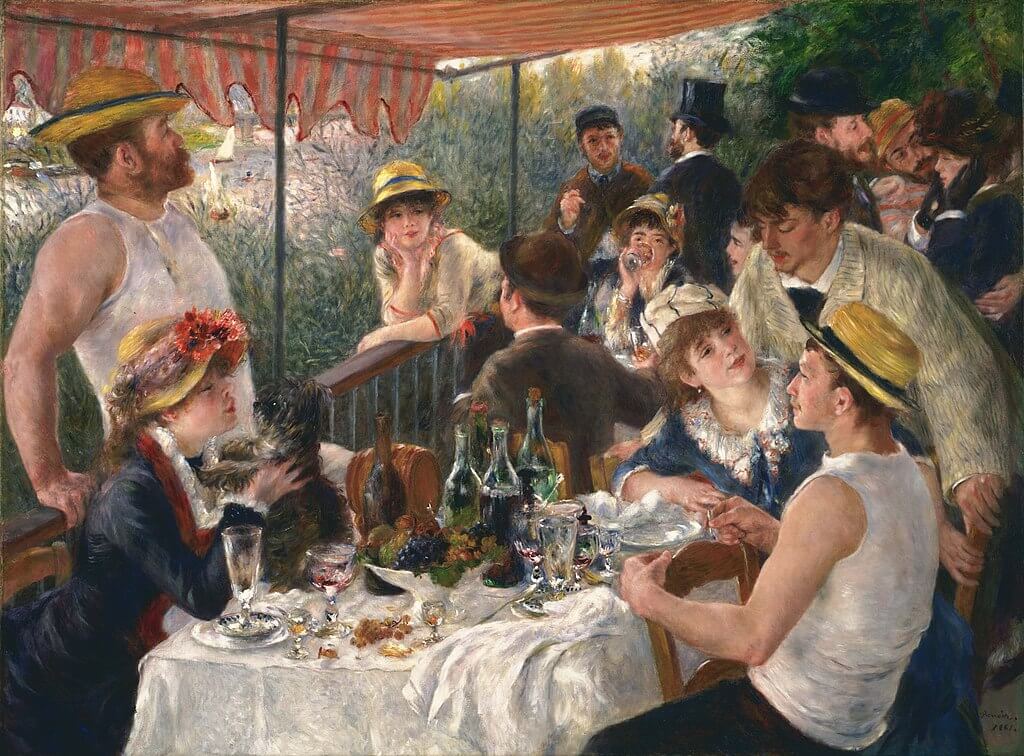
42 Handpicked Marcel Proust Quotes On Habits, Love, Desire, Misery, Memory, and Little Joys
-

43 Observations on Human Beings From Proust (Swann’s Way: In Search of Lost Time Vol 1)
What do you think of your emotions? Do you understand others around you?
*****
My much-awaited travel memoir
Journeys Beyond and Within…
is here!
In my usual self-deprecating, vivid narrative style (that you love so much, ahem), I have put out my most unusual and challenging adventures. Embarrassingly honest, witty, and introspective, the book will entertain you if not also inspire you to travel, rediscover home, and leap over the boundaries.
Grab your copy now!
Ebook, paperback, and hardcase available on Amazon worldwide. Make some ice tea and get reading 🙂
*****
*****
Want similar inspiration and ideas in your inbox? Subscribe to my free weekly newsletter "Looking Inwards"!



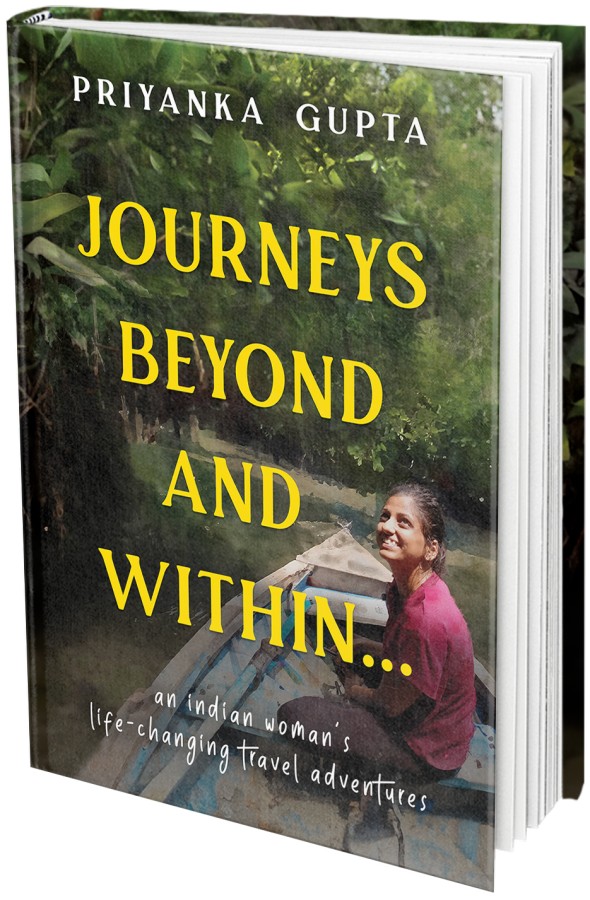
My parents were better than yours and treated with me a lot of respect. However I always felt that emotions were useless and always wondered why people weren’t more rational. (I was clearly wrong)
Emotions happen because emotions that’s the way the external world is interpreted by your mind and body.
I have to confess the stories about your upbringing cut too close. I think it happens because people don’t know how to deal with affection from other adults. It’s easier to deal with emotions from children for most.
Also parents love their kids but only upto a certain age. Beyond that they just want to have the “best kid”. They make big claims about love et al but its just a sham. They want the “best kid” and the most obedient kid. The one who ticked all the checkboxes and made it big. By my reading you were actually exceptional in this regard. At a certain point this becomes stultifying. Parents just want control and have a hard time letting go.
Regarding your brother locking you up in a small space, empathy is not enough. People don’t realize how tough things actually are until they experience them. The end of slavery was bought about a few folks who actually tried to live a few days in the life of a slave.
Your brother likely did not know that it was going to cause trauma and failed to understand why it was such a big deal.
Unless people experience something it’s hard to convey what it’s like to go through the experience. Words will never be enough.
Its great that you have managed to work through all of this.
Thank you for your comment, Narayan. I am sorry to be replying so late.
I hope you have a better understanding of emotions after reading this piece 🙂